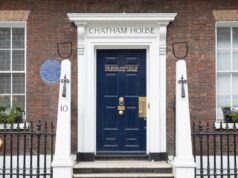Despite the Nigerian government faltering in providing palliative to citizens for the aggravation of their economic misery by the removal of petrol subsidy and foreign exchange reform, the President of the Senate, Godswill Akpabio, spared no expense in celebrating his 61st birthday, which he marked on 9 December.
The government, after protests by the labour movement, agreed to provide palliatives to workers and the most vulnerable of citizens. But the government has struggled to do this for the mass of Nigerians or to even sustain the token N35,000 it announced for its own workers, after making the first payment in September.
Mr Akpabio’s lavish event, held across two cities, could be described as an exhibition of wastefulness and insensitivity to the harrowing plight of Nigerians who are being forced to make more sacrifices from already dire situations, to rescue the economy from the pit it has fallen into largely due to the profligacy and ineptitude of the country’s leaders.
It began on Sunday when the senior members of the political class flew in private jets and chartered aircraft to Uyo, Akwa Ibom State, for a lavish party at a 30,000-seat stadium that Mr Akpabio built with state resources and named after himself when he was governor of the state.

The guests included the wife of the president, Remi Tinubu, state governors, ministers, senators and members of the House of Representatives. They were driven in a long motorcade of glittering automobiles to the stadium on the outskirts of the state capital where a capacity crowd of gaily dressed supporters, who had been bussed to the venue from across the state, waited to share crumbs from the feast.
The extravaganza continued in Abuja on Thursday with a colloquium in honour of the senate president that was beamed live on satellite television from the Transcorp Hilton.
A list of 74 senators was circulated on social media with the claim that they pledged about N150 million in support of the events. It was also alleged that a huge sum was taken from the Senate’s accounts. Those claims could not be independently verified by PREMIUM TIMES.
Mr Akpabio’s special adviser on media and publicity, Eseme Eyiboh, denied that funds were taken from the Senate account and government agencies for the event. But in a system where the National Assembly does not publish details of its budget and expenditure or make them available to the media even under a Freedom of Information Act request, it is difficult to verify Mr Eyiboh’s denials.
However, the extravagance and timing of the Senate President’s 61st birthday celebration buttress the perception of Mr Akpabio, and his colleagues in the Nigerian ruling class, as wasteful, tone deaf, stiff-necked and insensitive to the plight of the people they govern.
Akpabio’s notoriety for profligacy
The Senate President long acquired a notoriety for profligacy from when he was governor of Akwa Ibom between 2007 and 2015. He acted like an emperor and spent the resources of his state whimsically, with some of his more outlandish acts reported, HERE, HERE and HERE by PREMIUM TIMES.
In March 2013, Mr Akpabio, who was then a Peoples Democratic Party’s (PDP) governor, stunned fellow leaders of the then ruling party at a South-south zonal meeting in Port Harcourt, Rivers State, when he publicly announced a gift of N1 million to each of the state chairpersons of the PDP for their lunch.
The national chairman of the party at the time, Bamanga Tukur, had led party leaders from Abuja to Port Harcourt for the South-south round of a nationwide trip for reconciliation of feuding factions in the state chapters of the party.
The then-Delta State Governor Emmanuel Uduaghan had said poverty was widespread among party members in the zone and that action is needed to reduce the hardship.
“I join all my brothers in the South-south in welcoming you (Mr Tukur),” the Delta State governor said. “Even in my position as elected governor, I must tell you this; even if you tar all the roads in the South-south without putting food on the table, our members will not appreciate the party.
“If you want to prevent our members from straying to other parties, you must put food in the stomach of our supporters.”
Shortly after Mr Uduaghan spoke, Mr Akpabio sprang to his feet and announced a gift of N1 million each to state chairpersons of the party for their lunch as a way of placating them not to leave the party.
He said, “My brother governor, Uduaghan, said our members are hungry and that we must put food in their stomach so that they don’t stray to other parties. I am giving all the state chairmen of the party N1 million right now for Mr Biggs. Our members must not be hungry.”
The same year, the then-governor unilaterally donated N230 million on behalf of the newly-formed PDP Governors Forum to President Goodluck Jonathan’s hometown church. There were indications then that the governors were not informed before Mr Akpabio made the donation on their behalf.
At a forum held in honour of the movie industry in Nigeria on 3 March 2013, Mr Akpabio pledged an unsolicited N50 million for a so-called ‘Goodluck Jonathan Prize’ award for best performers in the film industry.
Mr Akpabio extended his “generosity” with public funds to individuals virtually on whims. Also in 2013, the then second-term governor shocked guests at the traditional wedding of Nigerian hip pop singer, Tuface Idibia, when he announced a gift of two brand new Toyota Prado SUVs to the musician and his bride, Annie Macaulay.
At the event in Eket, Mr Akpabio also announced that his government would send 29 delegates from the state to attend the white wedding of the couple in Dubai, the United Arab Emirates.
“On behalf of the government and good people of Akwa Ibom State, I have decided to donate two brand new Toyota SUVs to the couple,” the governor announced with glee. “Also 29 Akwa Ibom delegates will join the wedding which is billed to come up in Dubai.”

He also promised to rehabilitate the Eket-Ibeno Road ahead of the child dedication of Tuface and Annie.
Five days after gifting two SUVs to the Idibias, Mr Akpabio extended the largesse to himself when he acquired exotic bullet-proof sprinter luxury vans from US-based Texas Armoring Corporation (TAC). The armoured Mercedes Benz vans were customised to his specifications by TAC in Texas.
The vans were additions to a fleet of top-of-the-line bulletproof luxury Sport Utility Vehicles (SUV) that Mr Akpabio already had in his official convoy, making the latest purchase superfluous and insensitive, insiders in the government reportedly told the website.
In August, less than two months after he became Senate President, Mr Akpabio made a gaffe during plenary when he mistakenly revealed that money had been sent to senators to “enjoy” their recess.
Having apparently forgotten that the proceeding was being streamed live, Mr Akpabio began to address his colleagues before adjournment motion was moved at the end of the Senate’s ministerial screening.
“In order to enable all of us to enjoy our holidays, a token has been sent to our various accounts by the Clerk of the National Assembly,” he said.
When he was immediately informed by his colleagues that he was speaking on live television, Mr Akpabio quickly withdrew his comment.
“In order to allow you to enjoy your holiday, the senate president has sent prayers to your mailboxes to assist you to go on a safe journey and return,” Mr Akpabio rephrased the comment, apparently to correct what was considered an embarrassment.
Nigerians were outraged by Mr Akpabio’s revelation, given the economic hardship in the country.
PREMIUM TIMES later found out that the 109 senators got N2 million each, and that the “holiday allowance” was illegal as it was not provided for in the remuneration package approved by the Revenue Mobilisation, Allocation and Fiscal Commission, the body authorised by law to prepare salaries and allowances for public servants.
National culture of wastefulness
Mr Akpabio’s profligacy is reflective of a culture of wastefulness and absence of accountability in public financial management in Nigeria. The nature of the budgetary plans and general expenditure by government at the federal and sub-national levels, post-fuel subsidy removal, show that the leaders are against sharing in the sacrifice demanded by the economic crisis. They have continued to allocate or blow scarce resources on their own comfort, prestige projects and frivolities.
President Tinubu praised his own “courage” in declaring that fuel subsidy “is gone forever” even before he stepped into his office. But he has ignored the call for downsizing government and the cost of governance, where the same attribute is also required. His cabinet is the largest ever, contrasting sharply with the thinning Nigerian federal purse due to low oil production and exchange rate of the naira. He has continued borrowing to fund the budget, some of which prominent lines and priorities are scandalous.
While the president proposed to buy new SUVs for his office and that of his wife, and build a new residence for the vice president, the National Assembly has continued its endless renovation of its complex, bought top of the range SUVs for members and keeps increasing the numbers of Senate and House committees largely to feed the ego and aggrandisement of lawmakers.
Taking his cue from the president, Mr Akpabio appointed for himself over 50 special advisers and assistants, unmindful of the financial drain it constitutes to national revenue.
The wastefulness extends across all activities of government. While university teachers are threatening to return to their strike over the paltry allocation to the education sector, the Nigerian government sent 422 delegates to COP28 at the expense of scarce public fund. In August, the Senate transferred N2 million to the account of each senator as Sallah gift, even though they continue to draw N13 million monthly.
Why unbridled wastefulness is disturbing
Nigeria is going through some of its worst economic crises in its history. Since Mr Tinubu confirmed the termination of fuel subsidy in his inaugural speech on 29 May, the cost of living in the country and the poverty rate have risen astronomically. Retail petrol prices have increased by more than 163 per cent and after the shift to a unified, market-reflective foreign exchange regime, the naira has depreciated against the US dollar by about 41 per cent in the official market and 30 per cent in the parallel market.
The sharp increase in the price of fuel and other imported goods has contributed to inflation, which hit an 18-year record high of 28.2 per cent in November, the highest in 20 years, according to the National Bureau of Statistics ( NBS). The situation is compounded by insecurity with many rural communities deserted because of bandits rustling cattle and kidnapping people for ransom. Farmers are abandoning their farms for fear of kidnappers, with the North, where the bulk of the food in the country is produced, the worst hit.
The World Bank, in its Nigeria Development Update, December 2023 edition, entitled, “Turning The Corner (from reforms and renewed hope, to results)” stated that sluggish growth and rising inflation increased poverty from 40 per cent in 2018 to 46 per cent in 2023, pushing an additional 24 million people below the national poverty line. It said the number of poor Nigerians rose from 79 million in 2018 to 104 million in 2023, with urban poor — more exposed to inflation — increasing from 13 to 20 million, while the number of poor people in rural areas increased from 67 to 84 million.
The organised labour has been pressing for return of fuel subsidy, or a significant wage increase to enable Nigerians cope with the consequences. Despite the labour unions calling strikes twice, the government has stuck to its gun on the reforms, while promising to provide palliative to the citizens to cushion the harsh effects.
However, all that the government, at the state level, has done is distribute a few bowls of rice to people and offer small extra cash to workers for a few months. The federal government, which pledged to pay extra N35,000 to its workers, has only done so once in September. It has not also carried out other measures it promised in the same direction. In many federal establishments in Abuja, offices are deserted as workers cannot afford transportation fares for more than a few days in a month.
The World Bank noted that the reform decisions, while important for the country to avoid a fiscal cliff, have been followed by difficult economic adjustments. The Bank projects that the reforms will undo the increases in poverty seen in recent years from 2024 onward, albeit only marginally and slowly. “In the medium term, the reforms will reverse this trend through higher growth and lower inflation, but to a limited extent, with poverty rates decreasing from 46 per cent in 2024 to 44 per cent in 2026.”
According to the World Bank, successful implementation of the initiated reforms will be the first step toward improving Nigeria’s growth prospects. It highlighted that the implementation of fuel subsidy removal and foreign exchange unification rate would push economic growth to 3.5 per cent between 2023–2026, adding 0.5 percentage points to the growth potential in a scenario in which the reforms had not been implemented.
The Bank further stated that in the medium term, the economy will begin to benefit from increasing fiscal space for development spending.
Projecting that inflation will begin to fall in 2024, it added, “Together, such reforms would boost investment and productivity across sectors, unlocking the stronger growth that Nigeria’s economy demonstrably capable of, and allowing economic development to regain its fast pace.”
Building citizens’ trust
Implicit in the World Bank report is that Nigerians should not expect immediate benefits from the reforms. This further implies that citizens have to endure the pains for a few more years, if the intended results are to be achieved.
To get the cooperation of the citizens for the reforms, the government must win their trust. Public officials need to lead by example and share in the burdens by making visible adjustments in their own consumption and lifestyles. But that is not what Mr Akpabio and his colleagues are doing.
The profligate spending of public funds and conspicuous consumption of illicit wealth by public officials are an incitement to public rebellion.
To be sure, Mr Akpabio is not alone in the odious behaviour. But as the holder of the third highest political office in the country, the leader of the preeminent institution of democracy, a senior member of the ruling party and ally of a president whose agenda is to renew hope in Nigeria, a different attitude is expected of him.







